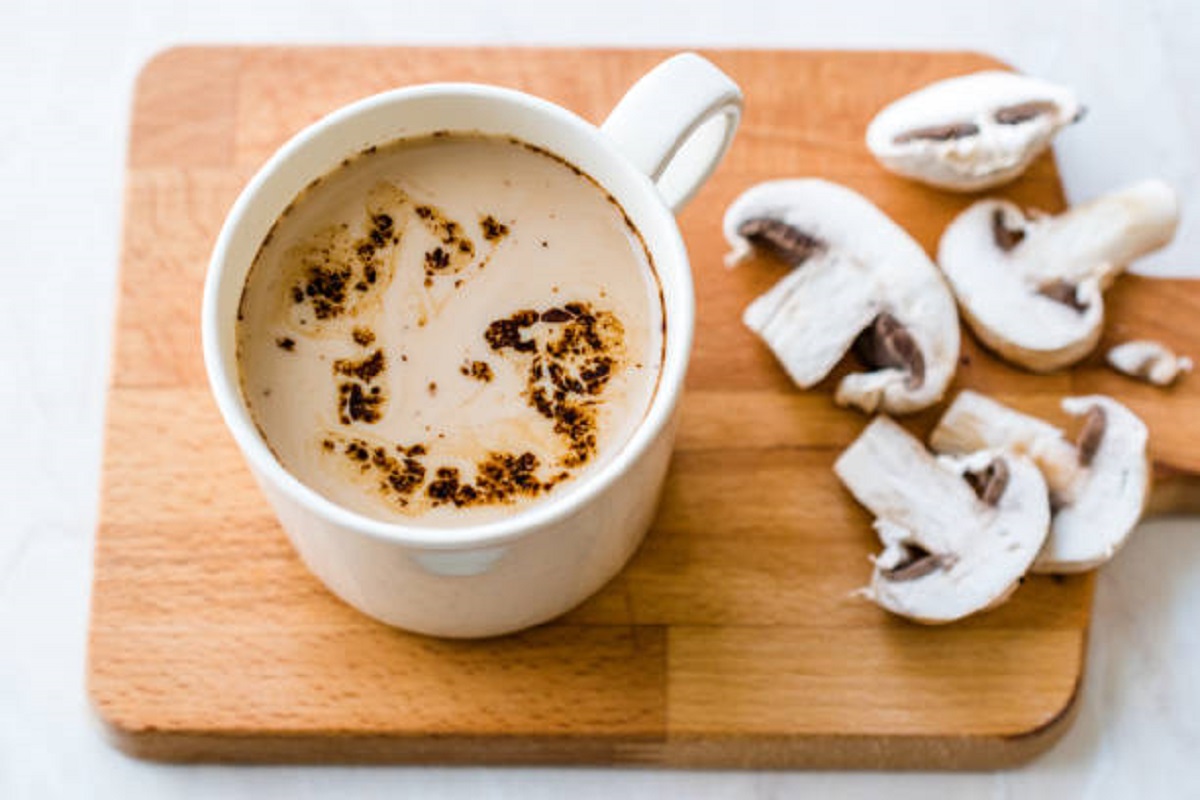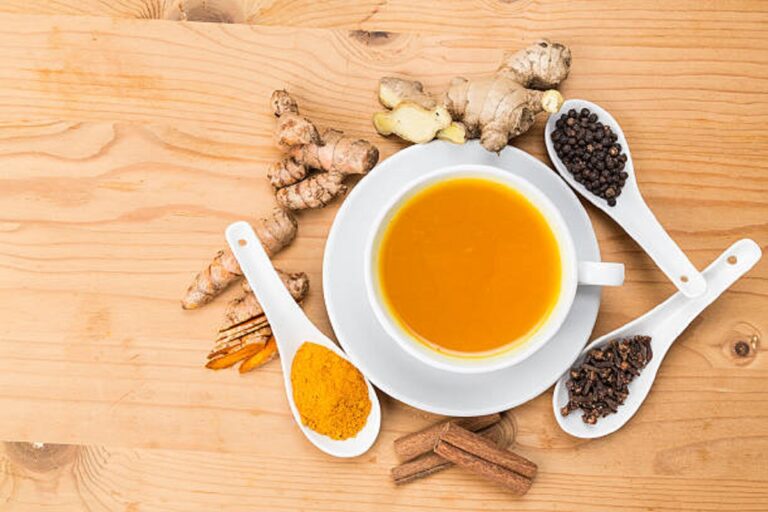WHAT FOUR SIGMATIC WON’T TELL YOU ABOUT MUSHROOM COFFEE
I’m just going to go ahead and say it – mushroom coffee sounds like something a health influencer invented after running out of regular ideas.
I was scrolling through Instagram one afternoon when this fancy mushroom coffee ad popped up, it was from Four Sigmatic. $45 for a tiny bag. My Nigerian brain immediately went: “Forty-five dollars for WHAT now?”
I mean, coffee and mushrooms? In the same cup?
There’s no way it’s going to work.
But, curiosity won. I went into my kitchen, looking at my regular instant coffee and the pack of dried mushrooms I bought for soup. Something clicked. Why am I paying premium prices for mushroom coffee when I literally have mushrooms sitting right there?
So I did what any reasonable person would do – I went down a rabbit hole researching mushroom coffee benefits simplified, and what I found will make you rethink everything about these trendy functional foods.
Let me tell you what the fancy brands don’t want you to know (and how to get the same benefits for way less money).
FIRST THINGS FIRST: WHAT IS MUSHROOM COFFEE?
Mushroom coffee isn’t coffee made from random grocery store button mushrooms. It’s regular coffee blended with powdered medicinal mushrooms like lion’s mane, chaga, cordyceps, or reishi.
These mushrooms aren’t new. They’ve been used for centuries in Traditional Chinese Medicine and other healing traditions. What’s new is the marketing: coffee as a delivery vehicle for adaptogens.
Adaptogens are plant or fungi compounds believed to help the body adapt to stress and restore balance. Think of them as your nervous system’s emotional support pet, except instead of purring, they tweak stress hormones.
MUSHROOM COFFEE BENEFITS SIMPLIFIED
I read through the studies so you don’t have to. Here’s the real science behind mushroom coffee in plain English.
1. Brain Support from Lion’s Mane
Lion’s mane contains compounds (hericenones and erinacines) that may help stimulate nerve growth factor (NGF) in the brain. Early research suggests it could improve focus and memory.
Translation: Might help you feel mentally sharper, but you still need sleep, hydration, and a break from Instagram.
2. Immune Boost from Chaga
Chaga mushrooms are packed with antioxidants, especially melanin and triterpenoids, which may help fight oxidative stress, and act as a shield against cell damage.
Translation: It’s like extra security guards for your cells.
3. Energy Support from Cordyceps
Cordyceps may help the body use oxygen more efficiently, which could improve endurance.
Translation: Might make your workouts feel slightly easier, but it won’t turn you into an Olympian.
4. Stress Balance from Reishi
Reishi is often called the “mushroom of immortality.” It may support relaxation, healthy sleep, and immune balance.
Translation:Could help you wind down after a stressful day. It’s basically nature’s chill pill.
MY DISCOVERY ABOUT REGULAR MUSHROOMS
I’m at the market one day buying ingredients for pepper soup. I grab some fresh shiitake mushrooms and start chatting with the vendor about their health benefits (yes, I’m that person now).
She tells me something that made me feel both smart and stupid at the same time: “These fresh ones have many of the same good things as those expensive powders you young people buy online.”
I went home and did the research. Turns out she’s absolutely right.
I went home and did the research. Turns out she’s absolutely right.
Fresh shiitake mushrooms contain:
– Beta-glucans for immune support
– Lentinan, a compound that’s been studied for its health benefits
– B vitamins for energy
– Antioxidants for cell protection
Regular button mushrooms(yes, the cheap ones) have:
– Ergothioneine, a powerful antioxidant
– Selenium for immune function
– Potassium for heart health
– Decent amounts of protein
I felt like I’d been paying designer prices for something I could get at my local market for a fraction of the cost.
THE BUDGET-FRIENDLY ALTERNATIVE: DIY MUSHROOM COFFEE
I figured out how to get mushroom coffee benefits simplified without breaking the bank.
Method 1: The Fresh Approach
– Sauté sliced shiitake or lion’s mane mushrooms in a dry pan until crispy
– Grind them into powder using a spice grinder
– Mix 1/2 teaspoon into your regular coffee
Method 2: The Dried Route
– Buy dried mushrooms in bulk (way cheaper than supplements)
– Grind into powder
– Store in an airtight container
– Add to coffee, smoothies, or soups
Method 3: The Lazy Person’s Version(my personal favorite)
– Buy mushroom powder in bulk from health food stores
– Skip the fancy branding and marketing
– Mix into your existing coffee routine
Method 4: (Extra)
What You Need:
-Regular ground coffee
-Mushroom extract powder (lion’s mane, chaga, etc.) you can buy these separately online
-A blender or stirrer
How To:
1. Brew your regular coffee.
2. Add 1–2 teaspoons of your mushroom powder.
3. Blend or stir until smooth.
4. Optional: Add cinnamon, oat milk, or honey to mask the earthy flavor
THE TASTE TEST REALITY CHECK of DIY MUSHROOM COFFEE
Let me be honest with you – mushroom coffee doesn’t taste like regular coffee. It’s earthier, sometimes a bit bitter, and definitely takes getting used to.
My first homemade cup tasted like I was drinking soil. But after tweaking the ratios and adding a bit of cinnamon and honey, I actually started liking it.
The key is starting small. Don’t dump a tablespoon of mushroom powder into your morning cup and expect magic. Start with 1/4 teaspoon and work your way up.
Pro tip: Adding a pinch of cacao powder masks the earthy taste and adds extra antioxidants. Win-win.
WHO SHOULDN’T ’t DRINK MUSHROOM COFFEE?
While mushroom coffee can sound or seem harmless, not everyone is eligible to drink it. Here’s a list of people who can’t dink it:
– Pregnant or breastfeeding people (safety data is limited)
– People on certain medications(like blood thinners or immunosuppressants)
– Anyone allergic to mushrooms(obviously)
Always check with a healthcare provider before adding any supplement to your routine.
WHAT STARTS HAPPENING AFTER A FEW MONTHS OF DIY MUSHROOM COFFEE?
Now, I’m not going to lie and say it will change your life overnight. But after a few months of adding mushroom powder to your morning routine, here’s what you can honestly notice:
Energy levels: You can expect to be more steady throughout the day. No more 3 PM crash like with regular coffee.
Sleep quality: You can drink mushroom coffee later in the day without it affecting your sleep.
Stress handling: You’ll be able to bounce back from stressful situations faster. It could be the placebo effect, could be the adaptogens.
Brain fog: Clearer thinking, especially in the mornings. (Always drink more water; it also helps)
THE BUDGET-FRIENDLY MUSHROOM STRATEGY THAT ACTUALLY WORKS
Here’s my simple system for getting mushroom coffee benefits simplified without the premium price:
Week 1-2: Start with regular shiitake mushrooms from the grocery store. Sauté and powder them. Add tiny amounts to coffee.
Week 3-4: If you like the effects, invest in bulk dried lion’s mane or reishi powder from a health food store.
Month 2 onwards: Create your own blend based on what you want to target (energy, stress, brain function).
Total monthly cost: $8-12 versus $45+ for branded versions.
The secret sauce isn’t the fancy packaging or the celebrity endorsements. It’s consistency and patience.
THE SCIENCE BEHIND WHY THIS ACTUALLY WORKS
Please permit me to geek out for a minute about why mushroom coffee benefits simplified actually make sense from a nutritional standpoint.
When you heat mushrooms (like in coffee), you break down the cell walls and make the beneficial compounds more bioavailable. That’s fancy talk for “your body can actually use the good stuff.”
The beta-glucans in mushrooms are like training wheels for your immune system. They help it recognize and respond to threats more effectively.
The adaptogens work on your hypothalamic-pituitary-adrenal axis (HPA axis for short). This is your body’s stress response system. By supporting this system, you handle stress better and maintain more stable energy levels.
A 2020 study published in the Food Journal found that regular consumption of medicinal mushrooms improved stress resilience and cognitive function in healthy adults. The participants were using whole mushroom powders, not expensive branded products.
Q: Is homemade mushroom coffee as effective as the expensive brands?
A: The active compounds are the same whether they’re in a $45 bag or a $8 bulk powder. The difference is marketing, packaging, and convenience. You’re paying for the same mushrooms either way.
Q: How long before I notice the effects of mushroom coffee benefits simplified?
A: Most people start noticing subtle changes after 2-3 weeks of consistent use. Energy levels usually improve first, followed by better stress handling and sleep quality. Don’t expect overnight miracles.
Q: Are there any side effects to mushroom coffee I should know about?
A: Medicinal mushrooms are generally safe for most people, but some may experience digestive upset if they start with too much too fast. People on blood-thinning medications should consult their doctor first, as some mushrooms can enhance these effects
The Real Truth About Functional Food Trends
Here’s what this whole mushroom coffee journey taught me about the wellness industry:
Most “superfood” trends aren’t scams, but they’re often overpriced solutions to problems you can solve for less money. The science behind adaptogens and medicinal mushrooms is solid. The $45 price tag isn’t.
The best functional foods are often hiding in plain sight at your local market. That humble shiitake mushroom has been providing health benefits for thousands of years before Instagram existed.
You don’t need to choose between your health and your budget. With a little research and experimentation, you can get the same benefits without the premium prices.
Mushroom coffee can be a nice way to blend caffeine with potential adaptogen benefits. But it’s not a miracle drink, and the dose in most store-bought blends may be too small for big effects.
If you love the taste and convenience, go for it. If you just want the benefits without the influencer tax DIY it.
Share in the comments: what wellness product are you ready to try making yourself? And if you experiment with DIY mushroom coffee, let me know how it goes. I love hearing about other people’s kitchen adventures (and failures).
Want more straight talk about expensive health trends and their budget-friendly alternatives? Subscribe for weekly reality checks that won’t break your bank account.
References:
1. Mori, K., et al. (2009). Improving cognitive function in elderly individuals: A randomized controlled trial. Phytotherapy Research, 23(3), 367-372.
2. Lee, I. K., & Yun, B. S. (2011). Styrylpyrones from the medicinal fungus Inonotus obliquus. Journal of Antibiotics, 64(4), 303–305.
3. Holliday, J., & Cleaver, M. (2008). Medicinal value of the caterpillar fungi species of the genus Cordyceps. International Journal of Medicinal Mushrooms, 10(3), 219–234.
4. Wasser, S. P. (2014). Medicinal mushroom science: Current perspectives, advances, evidences, and challenges. Biomedical Journal, 37(6), 345–356.
5. Lai, P. L., et al. (2013). Neurotrophic properties of the Lion’s mane medicinal mushroom. International Journal of Medicinal Mushrooms, 15(6), 539-554.
6. Chen, S., et al. (2012). Effect of Cs-4 on exercise performance in healthy older subjects. Medicine & Science in Sports & Exercise, 42(5), 1176-1183.
7. Wachtel-Galor, S., et al. (2011). Ganoderma lucidum (Reishi mushroom): Effects on stress and fatigue. Bioactive Foods in Promoting Health, 441-446.
8. Rathore, H., et al. (2017). The nutritional properties of mushrooms. Foods, 6(12), 4-18.
9. Spelman, K., et al. (2017). Neurological activity of Lion’s Mane. Journal of Restorative Medicine, 6(1), 19-26.



